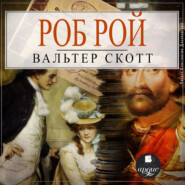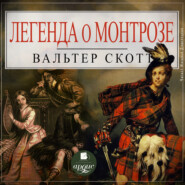По всем вопросам обращайтесь на: info@litportal.ru
(©) 2003-2024.
✖
Ivanhoe
Настройки чтения
Размер шрифта
Высота строк
Поля
“Our going thither,” said Cedric, “is uncertain. I love not these vanities, which were unknown to my fathers when England was free.”
“Let us hope, nevertheless,” said the Prior, “our company may determine you to travel thitherward; when the roads are so unsafe, the escort of Sir Brian de Bois-Guilbert is not to be despised.”
“Sir Prior,” answered the Saxon, “wheresoever I have travelled in this land, I have hitherto found myself, with the assistance of my good sword and faithful followers, in no respect needful of other aid. At present, if we indeed journey to Ashby-de-la-Zouche, we do so with my noble neighbour and countryman Athelstane of Coningsburgh, and with such a train as would set outlaws and feudal enemies at defiance.—I drink to you, Sir Prior, in this cup of wine, which I trust your taste will approve, and I thank you for your courtesy. Should you be so rigid in adhering to monastic rule,” he added, “as to prefer your acid preparation of milk, I hope you will not strain courtesy to do me reason.”
“Nay,” said the Priest, laughing, “it is only in our abbey that we confine ourselves to the ‘lac dulce’ or the ‘lac acidum’ either. Conversing with, the world, we use the world’s fashions, and therefore I answer your pledge in this honest wine, and leave the weaker liquor to my lay-brother.”
“And I,” said the Templar, filling his goblet, “drink wassail to the fair Rowena; for since her namesake introduced the word into England, has never been one more worthy of such a tribute. By my faith, I could pardon the unhappy Vortigern, had he half the cause that we now witness, for making shipwreck of his honour and his kingdom.”
“I will spare your courtesy, Sir Knight,” said Rowena with dignity, and without unveiling herself; “or rather I will tax it so far as to require of you the latest news from Palestine, a theme more agreeable to our English ears than the compliments which your French breeding teaches.”
“I have little of importance to say, lady,” answered Sir Brian de Bois-Guilbert, “excepting the confirmed tidings of a truce with Saladin.”
He was interrupted by Wamba, who had taken his appropriated seat upon a chair, the back of which was decorated with two ass’s ears, and which was placed about two steps behind that of his master, who, from time to time, supplied him with victuals from his own trencher; a favour, however, which the Jester shared with the favourite dogs, of whom, as we have already noticed, there were several in attendance. Here sat Wamba, with a small table before him, his heels tucked up against the bar of the chair, his cheeks sucked up so as to make his jaws resemble a pair of nut-crackers, and his eyes half-shut, yet watching with alertness every opportunity to exercise his licensed foolery.
“These truces with the infidels,” he exclaimed, without caring how suddenly he interrupted the stately Templar, “make an old man of me!”
“Go to, knave, how so?” said Cedric, his features prepared to receive favourably the expected jest.
“Because,” answered Wamba, “I remember three of them in my day, each of which was to endure for the course of fifty years; so that, by computation, I must be at least a hundred and fifty years old.”
“I will warrant you against dying of old age, however,” said the Templar, who now recognised his friend of the forest; “I will assure you from all deaths but a violent one, if you give such directions to wayfarers, as you did this night to
the Prior and me.”
“How, sirrah!” said Cedric, “misdirect travellers? We must have you whipt; you are at least as much rogue as fool.”
“I pray thee, uncle,” answered the Jester, “let my folly, for once, protect my roguery. I did but make a mistake between my right hand and my left; and he might have pardoned a greater, who took a fool for his counsellor and guide.”
Conversation was here interrupted by the entrance of the porter’s page, who announced that there was a stranger at the gate, imploring admittance and hospitality.
“Admit him,” said Cedric, “be he who or what he may;—a night like that which roars without, compels even wild animals to herd with tame, and to seek the protection of man, their mortal foe, rather than perish by the elements. Let his wants be ministered to with all care—look to it, Oswald.”
And the steward left the banqueting hall to see the commands of his patron obeyed.
CHAPTER 5 (#ulink_3b1cf342-a1e4-5837-8773-8356b0f9bab3)
Hath not a Jew eyes? Hath not a Jew hands, organs, dimensions, senses, affections, passions? Fed with the same food, hurt with the same weapons, subject to the same diseases, healed by the same means, warmed and cooled by the same winter and summer, as a Christian is?
—Merchant of Venice
Oswald, returning, whispered into the ear of his master, “It is a Jew, who calls himself Isaac of York; is it fit I should marshall him into the hall?”
“Let Gurth do thine office, Oswald,” said Wamba with his usual effrontery; “the swineherd will be a fit usher to the Jew.”
“St Mary,” said the Abbot, crossing himself, “an unbelieving Jew, and admitted into this presence!”
“A dog Jew,” echoed the Templar, “to approach a defender of the Holy Sepulchre?”
“By my faith,” said Wamba, “it would seem the Templars love the Jews’ inheritance better than they do their company.”
“Peace, my worthy guests,” said Cedric; “my hospitality must not be bounded by your dislikes. If Heaven bore with the whole nation of stiff-necked unbelievers for more years than a layman can number, we may endure the presence of one Jew for a few hours. But I constrain no man to converse or to feed with him.—Let him have a board and a morsel apart,—unless,” he said smiling, “these turban’d strangers will admit his society.”
“Sir Franklin,” answered the Templar, “my Saracen slaves are true Moslems, and scorn as much as any Christian to hold intercourse with a Jew.”
“Now, in faith,” said Wamba, “I cannot see that the worshippers of Mahound and Termagaunt have so greatly the advantage over the people once chosen of Heaven.”
“He shall sit with thee, Wamba,” said Cedric; “the fool and the knave will be well met.”
“The fool,” answered Wamba, raising the relics of a gammon of bacon, “will take care to erect a bulwark against the knave.”
“Hush,” said Cedric, “for here he comes.”
Introduced with little ceremony, and advancing with fear and hesitation, and many a bow of deep humility, a tall thin old man, who, however, had lost by the habit of stooping much of his actual height, approached the lower end of the board. His features, keen and regular, with an aquiline nose, and piercing black eyes; his high and wrinkled forehead, and long grey hair and beard, would have been considered as handsome, had they not been the marks of a physiognomy peculiar to a race, which, during those dark ages, was alike detested by the credulous and prejudiced vulgar, and persecuted by the greedy and rapacious nobility, and who, perhaps, owing to that very hatred and persecution, had adopted a national character, in which there was much, to say the least, mean and unamiable.
The Jew’s dress, which appeared to have suffered considerably from the storm, was a plain russet cloak of many folds, covering a dark purple tunic. He had large boots lined with fur, and a belt around his waist, which sustained a small knife, together with a case for writing materials, but no weapon. He wore a high square yellow cap of a peculiar fashion, assigned to his nation to distinguish them from Christians, and which he doffed with great humility at the door of the hall.
The reception of this person in the hall of Cedric the Saxon, was such as might have satisfied the most prejudiced enemy of the tribes of Israel. Cedric himself coldly nodded in answer to the Jew’s repeated salutations, and signed to him to take place at the lower end of the table, where, however, no one offered to make room for him. On the contrary, as he passed along the file, casting a timid supplicating glance, and turning towards each of those who occupied the lower end of the board, the Saxon domestics squared their shoulders, and continued to devour their supper with great perseverance, paying not the least attention to the wants of the new guest. The attendants of the Abbot crossed themselves, with looks of pious horror, and the very heathen Saracens, as Isaac drew near them, curled up their whiskers with indignation, and laid their hands on their poniards, as if ready to rid themselves by the most desperate means from the apprehended contamination of his nearer approach.
Probably the same motives which induced Cedric to open his hall to this son of a rejected people, would have made him insist on his attendants receiving Isaac with more courtesy. But the Abbot had, at this moment, engaged him in a most interesting discussion on the breed and character of his favourite hounds, which he would not have interrupted for matters of much greater importance than that of a Jew going to bed supperless. While Isaac thus stood an outcast in the present society, like his people among the nations, looking in vain for welcome or resting place, the pilgrim who sat by the chimney took compassion upon him, and resigned his seat, saying briefly, “Old man, my garments are dried, my hunger is appeased, thou art both wet and fasting.” So saying, he gathered together, and brought to a flame, the decaying brands which lay scattered on the ample hearth; took from the larger board a mess of pottage and seethed kid, placed it upon the small table at which he had himself supped, and, without waiting the Jew’s thanks, went to the other side of the hall;—whether from unwillingness to hold more close communication with the object of his benevolence, or from a wish to draw near to the upper end of the table, seemed uncertain.
Had there been painters in those days capable to execute such a subject, the Jew, as he bent his withered form, and expanded his chilled and trembling hands over the fire, would have formed no bad emblematical personification of the Winter season. Having dispelled the cold, he turned eagerly to the smoking mess which was placed before him, and ate with a haste and an apparent relish, that seemed to betoken long abstinence from food.
Meanwhile the Abbot and Cedric continued their discourse upon hunting; the Lady Rowena seemed engaged in conversation with one of her attendant females; and the haughty Templar, whose eye wandered from the Jew to the Saxon beauty, revolved in his mind thoughts which appeared deeply to interest him.
“I marvel, worthy Cedric,” said the Abbot, as their discourse proceeded, “that, great as your predilection is for your own manly language, you do not receive the Norman-French into your favour, so far at least as the mystery of woodcraft and hunting is concerned. Surely no tongue is so rich in the various phrases which the field-sports demand, or furnishes means to the experienced woodman so well to express his jovial art.”
“Good Father Aymer,” said the Saxon, “be it known
to you, I care not for those over-sea refinements, without which I can well enough take my pleasure in the woods. I can wind my horn, though I call not the blast either a ‘recheate’ or a ‘morte’—I can cheer my dogs on the prey, and I can flay and quarter the animal when it is brought down, without using the newfangled jargon of ‘curee, arbor, nombles’, and all the babble of the fabulous Sir Tristrem.”
“The French,” said the Templar, raising his voice with the presumptuous and authoritative tone which he used upon all occasions, “is not only the natural language of the chase, but that of love and of war, in which ladies should be won and enemies defied.”
“Pledge me in a cup of wine, Sir Templar,” said Cedric, “and fill another to the Abbot, while I look back some thirty years to tell you another tale. As Cedric the Saxon then was, his plain English tale needed no garnish from French troubadours, when it was told in the ear of beauty; and the field of Northallerton, upon the day of the Holy Standard, could tell whether the Saxon war-cry was not heard as far within the ranks of the Scottish host as the ‘cri de guerre’ of the boldest Norman baron. To the memory of the brave who fought there!—Pledge me, my guests.” He drank deep, and went on with increasing warmth. “Ay, that was a day of cleaving of shields, when a hundred banners were bent forwards over the heads of the valiant, and blood flowed round like water, and death was held better than flight. A Saxon bard had called it a feast of the swords—a gathering of the eagles to the prey—the clashing of bills upon shield and helmet, the shouting of battle more joyful than the clamour of a bridal. But our bards are no more,” he said; “our deeds are lost in those of another race—our language—our very name—is hastening to decay, and none mourns for it save one solitary old man—Cupbearer! knave, fill the goblets—To the strong in arms, Sir Templar, be their race or language what it will, who now bear them best in Palestine among the champions of the Cross!”
“It becomes not one wearing this badge to answer,” said Sir Brian de Bois-Guilbert; “yet to whom, besides the sworn Champions of the Holy Sepulchre, can the palm be assigned among the champions of the Cross?”
“To the Knights Hospitallers,” said the Abbot; “I have a brother of their order.”
“I impeach not their fame,” said the Templar; “nevertheless—-”
“I think, friend Cedric,” said Wamba, interfering, “that had Richard of the Lion’s Heart been wise enough to have taken a fool’s advice, he might have staid at home with his merry Englishmen, and left the recovery of Jerusalem to those same Knights who had most to do with the loss of it.”
“Were there, then, none in the English army,” said the Lady Rowena, “whose names are worthy to be mentioned with the Knights of the Temple, and of St John?”
“Forgive me, lady,” replied de Bois-Guilbert; “the English monarch did, indeed, bring to Palestine a host of gallant warriors, second only to those whose breasts have been the unceasing bulwark of that blessed land.”
“Second to NONE,” said the Pilgrim, who had stood near enough to hear, and had listened to this conversation with marked impatience. All turned toward the spot from whence this unexpected asseveration was heard.

















